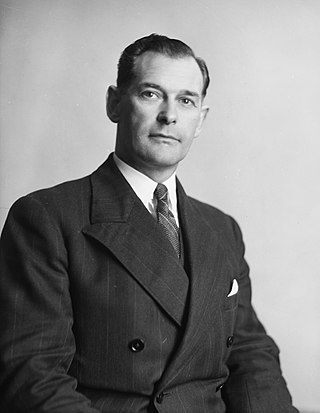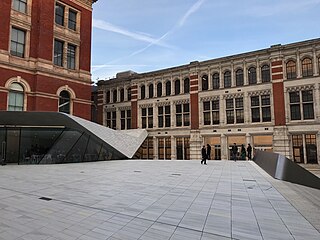
The Science Museum Group (SMG) consists of five British museums:

Sir Keith Jacka Holyoake, was a New Zealand politician who served as the 26th prime minister of New Zealand, serving for a brief period in 1957 and then from 1960 to 1972, and also as the 13th governor-general of New Zealand, serving from 1977 to 1980. He is the only New Zealand politician to have held both positions.

Tristram Julian William Hunt, is a British historian, broadcast journalist and former politician who has been Director of the Victoria and Albert Museum since 2017. He served as the Labour Member of Parliament (MP) for Stoke-on-Trent Central from 2010 to 2017, and Shadow Secretary of State for Education from 2013 to 2015.

Virginia Hilda Brunette Maxwell Bottomley, Baroness Bottomley of Nettlestone, is a British Conservative Party politician and headhunter. She was a Member of Parliament (MP) in the House of Commons from 1984 to 2005. She became a member of the House of Lords in 2005.

The Department for Culture, Media and Sport (DCMS) is a ministerial department of the Government of the United Kingdom. It holds the responsibility for culture and sport in England, and some aspects of the media throughout the UK, such as broadcasting. Its main offices are at 100 Parliament Street, occupying part of the building known as Government Offices Great George Street.
Mark Fisher is a British Labour Party politician. He was the Member of Parliament (MP) for Stoke-on-Trent Central from 1983 to 2010 and Minister for the Arts between 1997 and 1998.

Malcolm Hunt Wicks was a British Labour Party politician and academic specialising in social policy. He was a member of parliament (MP) from 1992, first for Croydon North West and then for Croydon North, until his death in 2012.

The government of Singapore is defined by the Constitution of the Republic of Singapore to consist of the President and the Executive. Executive authority of Singapore is vested in the President but exercised on the advice of the Cabinet led by the Prime Minister. The President, acting as the Head of State, may only act in their discretion in appointing the Prime Minister, acting as the Head of Government; as well as withholding consent for the dissolution of Parliament; along with performing key checks on the Government in addition to the ceremonial duties of the Head of State inherited from the Westminster system. The Cabinet, consisting of the Prime Minister and ministers appointed by the President on the Prime Minister's advice, is responsible for heading the Executive through ministries and other statutory boards. At the end of the term or at any time during the term, once the President has consented to a request made by the Prime Minister to dissolve Parliament, Parliamentary General Elections are held to elect members of Parliament for a new term. The President, in their discretion, then appoints a Prime Minister who is a member of Parliament representing any political party or coalition of political parties who in their judgement is likely to command the confidence of the majority of the members of Parliament. The Prime Minister then forms the Government and, along with the Cabinet, sets the general direction and control of the Government for the next term.

The Qatar Central Bank is the central bank of Qatar.

Peter Gerard Hendy, Baron Hendy of Richmond Hill,, is a British transport executive and politician who has served as Minister of State for Rail since July 2024.
Rob Dickins is a British music industry executive, who currently holds a number of trustee and consultant positions in music and the arts in the United Kingdom. Dickins began his music industry career at Warner Music UK.
Sir Benjamin William Elliot is a British businessman and fund-raiser for the Conservative Party who served as Co-Chairman of the Conservative Party from July 2019 alongside James Cleverly (2019–2020), Amanda Milling (2020–2021), Oliver Dowden (2021–2022), and Andrew Stephenson (2022) before resigning on 5 September 2022. In 2018, Elliot was appointed by Michael Gove, the Secretary of State for the Environment, as the UK government's first Food Surplus and Waste Champion. Elliot is the co-founder of the Quintessentially Group, a global luxury concierge service, and the co-founder of Hawthorn Advisors, a communications consultancy based in London. He is a nephew of Queen Camilla.
Deborah Anne Swallow is a British educator, museum curator and academic. From 2004 to 2023, she was Märit Rausing Director of The Courtauld Institute of Art and its Gallery; she was its first female Director. She previously worked at the University of Cambridge and the Victoria and Albert Museum. Alongside education and curation, she is a proponent of the broadest possible appreciation of art and its histories, and a specialist in Indian art and anthropology.

Martin Roth was a German museum director. He was the director general of the Dresden State Art Collections from 2001 to 2011 and the director of the Victoria and Albert Museum in London, UK, from 2011 to 2016.
Alan Charles Nelson Borg is a British historian. He is a former director of the Victoria and Albert Museum and librarian of the Order of St John.

Kavita Puri is a British journalist, radio broadcaster, and author. Her 2019 book, Partition Voices: Untold British Stories, is based on her award-winning BBC Radio 4 documentary series of the same name.

The Letters Patent Constituting the Office of Governor-General of New Zealand is a royal decree and a part of the uncodified New Zealand constitution. Sometimes known as the Letters Patent 1983, the instrument has been amended twice since its original issue in 1983. The letters patent—essentially an open letter from Queen Elizabeth II that is a legal instrument—constitutes the office of governor-general as the monarch's representative in the Realm of New Zealand, vests executive authority in the governor-general, establishes the Executive Council to advise the governor-general, and makes provision for the exercise of the governor-general's powers should the office be vacant.
The powers of the prime minister of the United Kingdom come from several sources of the UK constitution, including both statute and constitutional convention, but not one single authoritative document. They have been described as "...problematic to outline definitively."

The Exhibition Road Courtyard is a public courtyard that serves as an entrance to the Victoria & Albert Museum in London. It is part of the V&A Exhibition Road Quarter entrance and expansion of the Museum, completed in 2017 and designed by architectural practice AL_A, the firm of architect Amanda Levete.

























